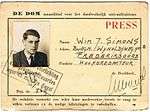Editorial independence
| Journalism |
|---|
 |
| Areas |
| Genres |
| Social impact |
| News media |
| Roles |
|
Editorial independence is the freedom of editors to make decisions without interference from the owners of a publication. Editorial independence is tested, for instance, if a newspaper runs articles that may be unpopular with its advertising clientele or critical of its ownership.
See also
- Embedded journalism
- Freedom of the press, the freedom from interference by governments
- Media manipulation
- Objectivity (journalism)
Related controversies
- Fox television and Monsanto Company[1][2][3] This story is featured at length in the documentaries The Corporation and Outfoxed.
References
- ↑ "Blowing the Whistle On Your Own Station.". Columbia Journalism Review. March 1, 2001. Retrieved 2008-09-10.
- ↑ Schweitzer, Sarah (August 19, 2000). "Reporter wins suit over firing". St. Petersburg Times. Retrieved 2008-09-10.
- ↑ "The media can legally lie". St. Louis Journalism Review. December 1, 2004. Retrieved 2008-09-10.
This article is issued from Wikipedia - version of the 4/21/2015. The text is available under the Creative Commons Attribution/Share Alike but additional terms may apply for the media files.